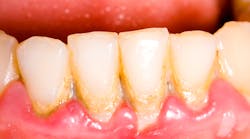Why do some people have tartar buildup and some never do? I’d always secretly blamed it on folks just being lazy and going to bed without brushing. But I may have been totally wrong—it might come down to the foods people eat.
Proper nutrition is our best medicine, and eating acellural carbohydrates can cause what’s termed “leaky gut”—inflammation in our digestive tract that causes an autoimmune problem within our bodies. It may well be the source of the inflammation in the mouth that leads to tooth decay and gum disease.
Tartar—or as we know it in the dental world, calculus— may build up on teeth (and retainers and nightguards) because of a vitamin deficiency, vitamin K2. Vitamin K2 directs the calcium in the blood where to go: in the teeth and in the bones. But if there’s a lack of it, the calcium ends up on the teeth and in the arteries.
Read my full blog post, the Truth About Tartar
A deficiency in this vitamin can spell more than tartar buildup: Low K2 levels may also be a marker for plaque and calcium buildup in the arteries. So taking the time to learn more about this important xx can help safeguard not just your patients’ teeth, but also their overall health.
More topics from my blog
Dental decay and conquering cavities
The advantages of tongue cleaning
Barbara Tritz, MSB, BSDATE, BRDH, is a biological dental hygienist and orofacial myofunctional therapist whose blog, Queen of Dental Hygiene, provides patients the information they need to help them on their healing journey. “Our one-hour appointment time was just not long enough to share all the many important facts I wanted our patients to learn. Dental hygiene is about so much more than just teaching brushing and flossing," says Barbara. “We are healers, educators, and lifesavers, and we need to give our patients the tools and skills to empower them to true wellness and health.






